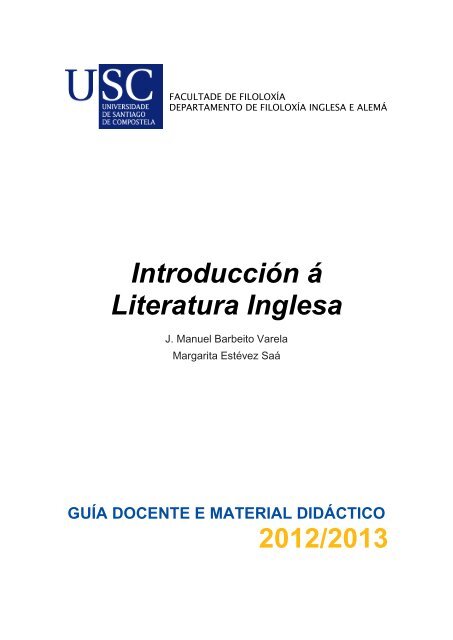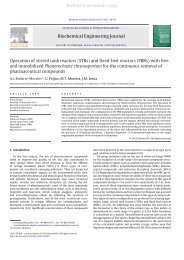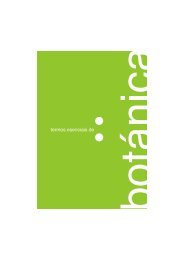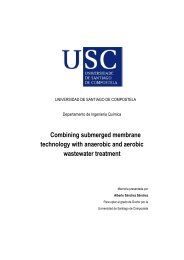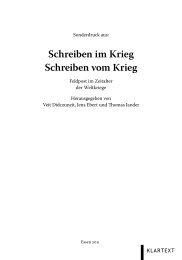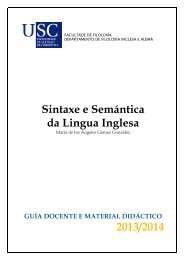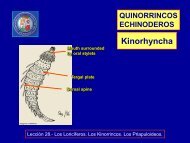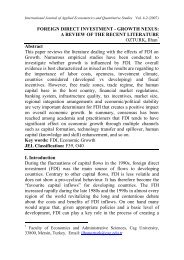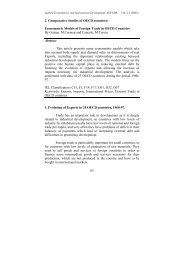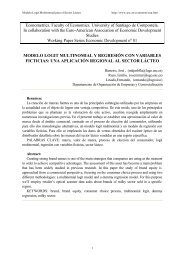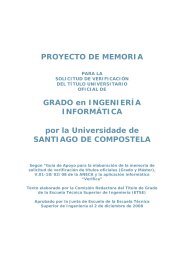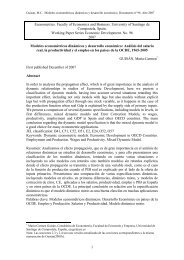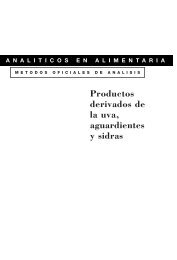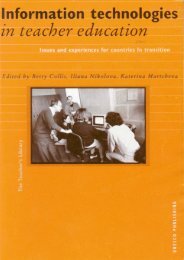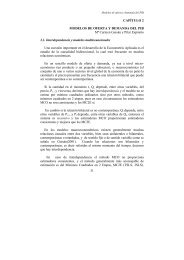Introducción á Literatura Inglesa 2012/2013 - Universidade de ...
Introducción á Literatura Inglesa 2012/2013 - Universidade de ...
Introducción á Literatura Inglesa 2012/2013 - Universidade de ...
Create successful ePaper yourself
Turn your PDF publications into a flip-book with our unique Google optimized e-Paper software.
FACULTADE DE FILOLOXÍA<br />
DEPARTAMENTO DE FILOLOXÍA INGLESA E ALEMÁ<br />
<strong>Introducción</strong> <strong>á</strong><br />
<strong>Literatura</strong> <strong>Inglesa</strong><br />
J. Manuel Barbeito Varela<br />
Margarita Estévez Sa<strong>á</strong><br />
GUÍA DOCENTE E MATERIAL DIDÁCTICO<br />
<strong>2012</strong>/<strong>2013</strong>
Guía Did<strong>á</strong>ctica <strong>de</strong> la asignatura <strong>Introducción</strong> a la <strong>Literatura</strong> <strong>Inglesa</strong><br />
FACULTADE DE FILOLOXÍA. DEPARTAMENTO DE FILOLOXÍA INGLESA E ALEMANA<br />
AUTORES: J. Manuel Barbeito Varela e Margarita Estévez Sa<strong>á</strong><br />
Edición electrónica. <strong>2012</strong><br />
ADVERTENCIA LEGAL: Reservados todos os <strong>de</strong>reitos. Queda prohibida a duplicación total ou<br />
parcial <strong>de</strong>sta obra, en calquera forma ou por calquera medio (electrónico, mec<strong>á</strong>nico, gravación,<br />
fotocopia ou outros) sen consentimento expreso por escrito dos autores.<br />
2
Guía Did<strong>á</strong>ctica <strong>de</strong> la asignatura <strong>Introducción</strong> a la <strong>Literatura</strong> <strong>Inglesa</strong><br />
1. Datos <strong>de</strong>scriptivos <strong>de</strong> la materia:<br />
Asignatura: <strong>Introducción</strong> a la literatura <strong>Inglesa</strong><br />
Código: G5061122<br />
Tipo <strong>de</strong> Asignatura, Ciclo y Curso en el que se imparte: Materia<br />
Obligatoria <strong>de</strong> 1er ciclo, 1 er curso <strong>de</strong>l Grado en Lengua y <strong>Literatura</strong><br />
<strong>Inglesa</strong>s<br />
Nº Créditos: 6 créditos ECTS<br />
Semestral (2º Semestre)<br />
Prerrequisitos:<br />
a) Normativos: Dominio medio <strong>de</strong>l inglés escrito, leído y hablado.<br />
La asignatura se imparte en inglés.<br />
b) Recomendados: Conocimientos <strong>de</strong> vocabulario crítico-literario y <strong>de</strong><br />
la cultura e historia <strong>de</strong> las Islas Brit<strong>á</strong>nicas. Por tanto, es muy<br />
importante que relaciones esta materia con las <strong>de</strong> Historia y<br />
cultura <strong>de</strong> los países <strong>de</strong> habla inglesa y Teoría y crítica literaria.<br />
Tutorías:<br />
Prof. Manuel Barbeito Varela<br />
Lugar: Despacho 411 (3ª planta <strong>de</strong> la Facultad <strong>de</strong> Filología)<br />
881811893<br />
Tu profesor te informar<strong>á</strong> el primer día <strong>de</strong> clase, pero<br />
también podr<strong>á</strong>s consultar sus horarios <strong>de</strong> tutorías en la p<strong>á</strong>gina<br />
Web <strong>de</strong> la USC y en el Aula Virtual <strong>de</strong> la asignatura.<br />
3
Guía Did<strong>á</strong>ctica <strong>de</strong> la asignatura <strong>Introducción</strong> a la <strong>Literatura</strong> <strong>Inglesa</strong><br />
Profa. Margarita Estévez Sa<strong>á</strong><br />
Lugar: Despacho 327 (3ª planta <strong>de</strong> la Facultad <strong>de</strong> Filología)<br />
881811839<br />
Tu profesora te informar<strong>á</strong> el primer día <strong>de</strong> clase, pero<br />
también podr<strong>á</strong>s consultar sus horarios <strong>de</strong> tutorías en la p<strong>á</strong>gina<br />
Web <strong>de</strong> la USC y en el Aula Virtual <strong>de</strong> la asignatura.<br />
<br />
Debes distinguir entre las tutorías personales opcionales en el <strong>de</strong>spacho <strong>de</strong>l profesor,<br />
en el horario que encontrar<strong>á</strong>s en la p<strong>á</strong>gina web, y las tutorías programadas<br />
obligatorias que tendr<strong>á</strong>n lugar en el lugar y hora señalados por el Decanato <strong>de</strong> la<br />
Facultad <strong>de</strong> Filología, y que se anunciar<strong>á</strong>n en el Aula Virtual <strong>de</strong> la asignatura.<br />
2. Sentido <strong>de</strong> la materia en el perfil:<br />
I. Bloque formativo en el que ha <strong>de</strong> encuadrarse la materia: <strong>Literatura</strong> y Cultura<br />
<strong>Inglesa</strong> (<strong>Literatura</strong> y Cultura <strong>Inglesa</strong> y Norteamericana).<br />
II. Esta materia te proporcionar<strong>á</strong> una primera aproximación panor<strong>á</strong>mica a la literatura<br />
<strong>de</strong> las Islas Brit<strong>á</strong>nicas. Al final <strong>de</strong>l curso habr<strong>á</strong>s obtenido un “mapa” <strong>de</strong> la literatura <strong>de</strong><br />
las Islas Brit<strong>á</strong>nicas que te permitir<strong>á</strong> situar en su contexto socio-cultural los<br />
movimientos, obras y autores m<strong>á</strong>s representativos <strong>de</strong> la literatura inglesa. Estos<br />
movimientos, autores y obras se estudiar<strong>á</strong>n en profundidad en futuras materias <strong>de</strong><br />
<strong>Literatura</strong> <strong>Inglesa</strong>.<br />
II.1 Explicación general <strong>de</strong>l sentido <strong>de</strong> la organización y <strong>de</strong>l <strong>de</strong>sarrollo <strong>de</strong>l curso:<br />
Deber<strong>á</strong>s tener siempre presente que se trata ante todo <strong>de</strong> formar la mente no <strong>de</strong><br />
acumular datos:<br />
1) El programa tiene un argumento o hilo conductor que <strong>de</strong>ber<strong>á</strong>s seguir en cada<br />
momento <strong>de</strong> su <strong>de</strong>sarrollo y que te permitir<strong>á</strong> compren<strong>de</strong>r el sentido <strong>de</strong>l curso y<br />
así organizar todos sus elementos: En todos los capítulos abordaremos aspectos<br />
<strong>de</strong>l problema <strong>de</strong>l or<strong>de</strong>n y <strong>de</strong>l sujeto individual que son <strong>de</strong>cisivos para<br />
compren<strong>de</strong>r la tradición literaria inglesa.<br />
2) Los esquemas a tu disposición en el aula virtual tienen una triple función: a)<br />
mostrar la estructura <strong>de</strong>l argumento <strong>de</strong>l curso. b) Formarte en la organización <strong>de</strong><br />
4
Guía Did<strong>á</strong>ctica <strong>de</strong> la asignatura <strong>Introducción</strong> a la <strong>Literatura</strong> <strong>Inglesa</strong><br />
datos en torno a una i<strong>de</strong>a. c) Facilitar (nunca sustituir) la toma <strong>de</strong> apuntes ya que<br />
contienen los datos m<strong>á</strong>s relevantes.<br />
4) Al final <strong>de</strong> cada tema hay una sesión <strong>de</strong> preguntas sobre el mismo. Las<br />
tutorías programadas te dar<strong>á</strong>n una nueva oportunidad <strong>de</strong> clarificar los puntos<br />
oscuros.<br />
4) Deber<strong>á</strong>s entregar un portafolio por tema siguiendo la plantilla que tienes a tu<br />
disposición en el aula virtual. El portafolio ser<strong>á</strong> material <strong>de</strong> trabajo en las<br />
tutorías personalizadas.<br />
5) El mo<strong>de</strong>lo <strong>de</strong> examen <strong>de</strong>be servirte como guía <strong>de</strong> aprendizaje. Deber<strong>á</strong>s<br />
redactar una respuesta a una pregunta por tema igual o semejante a las que<br />
aparecen en el mo<strong>de</strong>lo <strong>de</strong> examen (y en el espacio que te da el examen) para<br />
entregarla al profesor junto con el portafolio.<br />
6) Recuerda siempre: no basta con apren<strong>de</strong>rse los temas <strong>de</strong> forma m<strong>á</strong>s o menos<br />
memorística. Debes apren<strong>de</strong>r a manejar lo que sabes.<br />
III. El conocimiento <strong>de</strong> la relación entre el texto y su contexto fomentar<strong>á</strong> una actitud<br />
crítica y te invitar<strong>á</strong> a relacionar la producción literaria con otras manifestaciones<br />
artísticas y culturales <strong>de</strong> cada momento. Te iniciar<strong>á</strong>s, a<strong>de</strong>m<strong>á</strong>s, en el comentario <strong>de</strong>l texto<br />
literario.<br />
Se trata <strong>de</strong> que empieces a familiarizarte con un vocabulario y unas pr<strong>á</strong>cticas que te<br />
capacitar<strong>á</strong>n para aproximarte con espíritu crítico a cualquier manifestación cultural.<br />
Observa que el examen te exige capacidad <strong>de</strong> síntesis, una capacidad que el curso te<br />
ayudar<strong>á</strong> a adquirir: <strong>de</strong>ber<strong>á</strong>s apren<strong>de</strong>r a seleccionar los datos m<strong>á</strong>s relevantes y a exponer<br />
<strong>de</strong> forma clara las i<strong>de</strong>as m<strong>á</strong>s relevantes <strong>de</strong> cada tema.<br />
Estas <strong>de</strong>strezas podr<strong>á</strong>s emplearlas en el futuro en tareas <strong>de</strong> organización y<br />
procesamiento <strong>de</strong> datos, comentario crítico general, an<strong>á</strong>lisis e información cultural,<br />
an<strong>á</strong>lisis textual, edición, revisión <strong>de</strong> textos etc.<br />
IV. Los conocimientos y <strong>de</strong>strezas que te proporciona esta asignatura se consi<strong>de</strong>ran<br />
fundamentales en las <strong>Universida<strong>de</strong></strong>s europeas m<strong>á</strong>s prestigiosas en el <strong>á</strong>mbito <strong>de</strong> las<br />
Humanida<strong>de</strong>s y los Estudios Ingleses.<br />
5
Guía Did<strong>á</strong>ctica <strong>de</strong> la asignatura <strong>Introducción</strong> a la <strong>Literatura</strong> <strong>Inglesa</strong><br />
3. Objetivos <strong>de</strong> la Materia:<br />
Objetivos<br />
Proporcionar al estudiante una visión panor<strong>á</strong>mica <strong>de</strong>l <strong>de</strong>sarrollo <strong>de</strong> la<br />
literatura inglesa <strong>de</strong>s<strong>de</strong> sus orígenes hasta la actualidad.<br />
Apren<strong>de</strong>r a relacionar la producción literaria <strong>de</strong> un <strong>de</strong>terminado período<br />
con el contexto social, cultural y político en el que tuvo lugar.<br />
Familiarizar al estudiante con la lectura y la escritura críticas <strong>de</strong> textos <strong>de</strong><br />
la literatura inglesa, proporcion<strong>á</strong>ndole los instrumentos y métodos<br />
filológicos a<strong>de</strong>cuados a tal fin.<br />
Adquisición <strong>de</strong> la sensibilidad lingüística.<br />
Competencias<br />
Conocimiento diacrónico <strong>de</strong> la historia <strong>de</strong> la literatura inglesa.<br />
Capacidad <strong>de</strong> relacionar los períodos y movimientos literarios con el<br />
contexto social, cultural y político en el que surgieron.<br />
Dominio <strong>de</strong> un vocabulario crítico que permita analizar e interpretar<br />
documentos literarios <strong>de</strong>s<strong>de</strong> un punto <strong>de</strong> vista filológico.<br />
Capacidad <strong>de</strong> an<strong>á</strong>lisis <strong>de</strong> documentos culturales, principalmente literarios.<br />
Capacidad <strong>de</strong> organización <strong>de</strong> las i<strong>de</strong>as, <strong>de</strong>sarrollo coherente <strong>de</strong> las<br />
mismas, habilidad <strong>de</strong> argumentar y sustentar opiniones, capacidad <strong>de</strong><br />
resumir, etc.<br />
Capacidad <strong>de</strong> enten<strong>de</strong>r el pensamiento <strong>de</strong> las palabras y su sentido<br />
histórico.<br />
Capacidad <strong>de</strong> síntesis, <strong>de</strong> an<strong>á</strong>lisis y <strong>de</strong> organización <strong>de</strong> datos.<br />
Capacidad <strong>de</strong> escribir con claridad y precisión.<br />
Capacidad <strong>de</strong> tomar notas.<br />
6
Guía Did<strong>á</strong>ctica <strong>de</strong> la asignatura <strong>Introducción</strong> a la <strong>Literatura</strong> <strong>Inglesa</strong><br />
4. Contenidos <strong>de</strong> la Materia:<br />
Temario: <br />
Anglo-Saxon Literature. (1 semana)<br />
Medieval Literature. (2 semanas)<br />
Renaissance Literature. (2 semanas)<br />
Revolution and Restoration Literature. (1 semana)<br />
The Enlightenment. Eighteenth century literature. (1 semana)<br />
Romantic and Early Victorian Literature. (2 semanas)<br />
Victorian Literature. (2 semanas)<br />
Edwardian and Mo<strong>de</strong>rnist Literature ; the Thirties. (2 semanas)<br />
Post-War and Postmo<strong>de</strong>rnist Literature. (1 semana)<br />
Esta asignatura est<strong>á</strong> dividida en nueve temas que presentan un grado<br />
semejante <strong>de</strong> dificultad. No obstante, <strong>de</strong>dicaremos una semana m<strong>á</strong>s a los temas<br />
2, 3, 7, 8 y 9 <strong>de</strong>bido a su extensión o a la mayor dificultad <strong>de</strong> las manifestaciones<br />
literarias correspondientes a las mismas. Fíjate bien que hemos <strong>de</strong>stacado la<br />
importancia <strong>de</strong> establecer relaciones entre los distintos períodos literarios por<br />
medio <strong>de</strong> flechas: <br />
Esta señal marca los aspectos <strong>de</strong> cada tema m<strong>á</strong>s relevantes e<br />
imprescindibles para la correcta comprensión <strong>de</strong>l mismo.<br />
También hemos señalado en muchos temas las dificulta<strong>de</strong>s m<strong>á</strong>s<br />
importantes con las que pue<strong>de</strong>s encontrarte y cómo po<strong>de</strong>mos subsanarlas.<br />
Dedicaremos clases EXPOSITIVAS y sesiones INTERACTIVAS a cada<br />
unidad, y nos reuniremos en grupos <strong>de</strong> TUTORÍAS tres veces durante el<br />
semestre:<br />
-En las clases EXPOSITIVAS tus profesores te aportar<strong>á</strong>n un mapa <strong>de</strong> la<br />
historia <strong>de</strong> la literatura inglesa.<br />
-Las sesiones INTERACTIVAS semanales estar<strong>á</strong>n <strong>de</strong>dicadas a la<br />
realización <strong>de</strong> comentarios <strong>de</strong> texto y a la pr<strong>á</strong>ctica <strong>de</strong> lecturas <strong>de</strong> los<br />
textos seleccionados correspondientes a cada unidad.<br />
-En las TUTORÍAS PROGRAMADAS, evaluaremos el seguimiento <strong>de</strong> la<br />
7
Guía Did<strong>á</strong>ctica <strong>de</strong> la asignatura <strong>Introducción</strong> a la <strong>Literatura</strong> <strong>Inglesa</strong><br />
asignatura: revisaremos tus apuntes y tu portafolios, aclararemos tus<br />
dudas y comprobaremos el grado <strong>de</strong> asimilación <strong>de</strong> la materia.<br />
AULA VIRTUAL<br />
Para el seguimiento <strong>de</strong> esta asignatura es imprescindible utilizar el aula virtual<br />
don<strong>de</strong> encontrar<strong>á</strong>s puntualmente los esquemas <strong>de</strong> las diferentes unida<strong>de</strong>s que figuran<br />
en el programa así como la selección <strong>de</strong> textos que se comentan en las clases<br />
interactivas. No <strong>de</strong>ber<strong>á</strong>s confundirte y pensar que los esquemas sustituyen la<br />
toma <strong>de</strong> apuntes.<br />
Es fundamental que, un par <strong>de</strong> días antes <strong>de</strong> las sesiones interactivas, consultes el<br />
Aula Virtual y <strong>de</strong>scargues los documentos preparados por tus profesores para esas<br />
sesiones.<br />
En cada tema hay una sección titulada COMPULSORY READINGS, en<br />
la que te informamos <strong>de</strong> una serie <strong>de</strong> lecturas obligatorias que has <strong>de</strong> traer<br />
preparadas a clase. Los textos estar<strong>á</strong>n el Aula Virtual <strong>de</strong> la asignatura con<br />
antelación. La selección <strong>de</strong> lecturas respon<strong>de</strong> al hilo tem<strong>á</strong>tico que guía la<br />
asignatura: El problema <strong>de</strong>l or<strong>de</strong>n y el sujeto individual y la evolución <strong>de</strong> su<br />
reflejo a nivel tem<strong>á</strong>tico y formal en la historia <strong>de</strong> la literatura inglesa.<br />
This will be a history of i<strong>de</strong>as, i<strong>de</strong>ologies, artistic ten<strong>de</strong>ncies, and literary<br />
movements, rather than a history of individual writers. We shall pay special attention<br />
to the rise of genres and to the social-political conditions in which they appeared.<br />
Five are the main aspects to be studied in each period:<br />
I. Social, economic and cultural context.<br />
II. Material conditions of the production of literature: production (the<br />
writer’s status, printing), circulation (oral tradition, means of<br />
publication), reception (group, individual).<br />
III. Poetics. The function of literature; language and form; themes.<br />
IV. Genres, movements, writers.<br />
V. Other artistic manifestations.<br />
TEXTBOOKS:<br />
Carter, Ronald and John McRae, The Routledge History of Literature in English.<br />
Britain and Ireland. 2ª edición. London & New York: Routledge, 2006.<br />
San<strong>de</strong>rs, Andrew. The Short Oxford History of English Literature. Oxford: Oxford<br />
University Press, 1994.<br />
OTHER REFERENCE BOOKS:<br />
Abrams, M. H., et. al., gen. ed., The Norton Anthology of English Literature. 2 vols.<br />
8
Guía Did<strong>á</strong>ctica <strong>de</strong> la asignatura <strong>Introducción</strong> a la <strong>Literatura</strong> <strong>Inglesa</strong><br />
7 th ed. New York: Norton, 2000.<br />
Ackroyd, Albion. The Origins of the English Imagination (London: Chatto and<br />
Windus, 2002).<br />
Alexan<strong>de</strong>r, Michael. A History of English Literature. London: Macmillan, 2000.<br />
Barbeito Varela, J. Manuel, El individuo y el mundo mo<strong>de</strong>rno. El drama <strong>de</strong> la<br />
i<strong>de</strong>ntidad en siete cl<strong>á</strong>sicos <strong>de</strong> la literatura brit<strong>á</strong>nica. Oviedo: Septem, 2004.<br />
Burgess, A. English Literature: A Survey for Stu<strong>de</strong>nts. Essex: Longman, 1974.<br />
Connor, Steven, The English Novel in History: 1950-1995. London: Macmillan,<br />
1996.<br />
Cornwell, Neil, The Literary Fantastic: From Gothic to Postmo<strong>de</strong>rnism. New York:<br />
Harvester, 1990.<br />
Cuddon, J. A. The Penguin Dictionary of Literary Terms and Literary Theory.<br />
London: Penguin Books, 1991.<br />
Drabble, Margaret, ed. The Oxford Companion to English Literature. 5 th edition.<br />
Oxford: Oxford University Press, 1985.<br />
Ford, Boris, ed. The Pelican Gui<strong>de</strong> to English Literature. 8 vols. Harmondsworth:<br />
Penguin, 1988.<br />
Fowler, Alastair. A History of English Literature: Forms and Kinds from the Middle<br />
Ages to the Present. Oxford: Blackwell, 1987.<br />
Kun<strong>de</strong>ra, Milan, The Art of the Novel (London: Faber, 1988)<br />
Parrin<strong>de</strong>r, Nation & the Novel. Oxford: O.U.P, 2006.<br />
Rogers, Pat, ed., The Oxford Illustrated History of English Literature. Oxford:<br />
Oxford University Press, 1987.<br />
9
Guía Did<strong>á</strong>ctica <strong>de</strong> la asignatura <strong>Introducción</strong> a la <strong>Literatura</strong> <strong>Inglesa</strong><br />
<br />
<br />
Anglo-Saxon Literature. The Fusion of Two Cultures:<br />
Germanic and Christian. (1 week)<br />
CLASES EXPOSITIVAS:<br />
I. The formation of a nation. Migrations: Saxons and Anglos.<br />
Main social institutions. The values of a heroic society.<br />
Christianization. The fusion of two cultures. From the<br />
Heptarchy to one kingdom. The Dane law.<br />
II. The material conditions of the production of literature.<br />
Orality. Authorship. Transmission. The Manuscripts. The<br />
Convents. King Alfred’s court (871-899). The Monastic<br />
revival. Women insi<strong>de</strong> and outsi<strong>de</strong> the convent.<br />
III. Poetics. The function of literature. Themes. The conflict of<br />
values. Form and style. The line. Alliteration, kennings and<br />
variations.<br />
IV. Anglo-Saxon Poetry and Prose. Epic poetry and the elegy.<br />
Celtic myths and legends. Anglo-Saxon Prose. Translations.<br />
V. Sutton Hoo; Staffordshire Hoard. The Gospels. Lindisfarne.<br />
The Book of Kells.<br />
Compulsory Reading:<br />
(Reading prior to class is required)<br />
Passages from Beowulf.<br />
The Dream of the Rood.<br />
SESIONES INTERACTIVAS:<br />
Note that the language of Anglo-Saxon Literature –Old English is very different<br />
from the English we speak nowadays. Since you do not have linguistic competence in<br />
Old English, we shall mainly use mo<strong>de</strong>rnised versions of the texts.<br />
Compulsory Activity:<br />
<br />
You must write a commentary on the text discussed in class and inclu<strong>de</strong> it in your<br />
portfolio to be revised in the assigned tutorials.<br />
10
Guía Did<strong>á</strong>ctica <strong>de</strong> la asignatura <strong>Introducción</strong> a la <strong>Literatura</strong> <strong>Inglesa</strong><br />
Recommen<strong>de</strong>d Editions:<br />
Alexan<strong>de</strong>r, Michael, trans. Beowulf. London: Penguin Books, 1973.<br />
Heaney, Seamus, trans. Beowulf: A New Translation. London: Faber & Faber, 1999.<br />
Kennedy, Charles W. An Anthology of Old English Poetry. New York: Oxford<br />
University Press, 1966.<br />
Treharne, Elaine, ed. Old and Middle English. An Anthology. Oxford: Blackwell, 2000.<br />
Recommen<strong>de</strong>d Further Reading:<br />
Carter, Ronald and John McRae, The Routledge History of Literature in English.<br />
Britain and Ireland. 2ª edición. London & New York: Routledge, 2006.<br />
Galv<strong>á</strong>n Reula, J. F., ed. Estudios literarios ingleses: Edad Media. Madrid: C<strong>á</strong>tedra,<br />
1985.<br />
The following chapters are especially relevant for this unit:<br />
-Susana Onega, “Poesía épica anglosajona: Beowulf” (17-42)<br />
-Francisco García Tortosa, “La estructura tem<strong>á</strong>tica <strong>de</strong> las elegías anglosajonas” (43-68)<br />
-Enrique Bern<strong>á</strong>r<strong>de</strong>z, “El lenguaje <strong>de</strong> la poesía anglosajona” (69-84)<br />
Additional bibliography will be provi<strong>de</strong>d at the beginning of each unit.<br />
Calendario:<br />
Enero <strong>2013</strong><br />
L M Mi J V S D<br />
1 2 3 4 5 6<br />
7 8 9 10 12 12 13<br />
14 15 16 17 18 19 20<br />
21<br />
28<br />
22<br />
29<br />
23<br />
30<br />
24<br />
31<br />
25 26 27<br />
Febrero <strong>2013</strong><br />
L M Mi J V S D<br />
1 2 3<br />
4 5 6 7 8 9 10<br />
11 12 13 14 15 16 17<br />
18<br />
25<br />
19<br />
26<br />
20<br />
27<br />
21<br />
28<br />
22 23 24<br />
Tiempo que <strong>de</strong>dicaremos al <strong>de</strong>sarrollo <strong>de</strong> este primer tema.<br />
11
Guía Did<strong>á</strong>ctica <strong>de</strong> la asignatura <strong>Introducción</strong> a la <strong>Literatura</strong> <strong>Inglesa</strong><br />
<br />
<br />
Medieval Literature. Continental Influence. From anonymity<br />
to Individualism. (2 Weeks)<br />
CLASES EXPOSITIVAS:<br />
I. General context.<br />
I.1. The High Middle Ages (1001–1300). The Norman invasion (1066).<br />
Towards the UK; the conquest of Ireland (Henry II, 1154–1189). Feudalism.<br />
Kings and nobles; the fragmentation of power; the Magna Carta (1215).<br />
Population increase. Towns. The first universities. Politics and religion:<br />
religious conflicts (the Crusa<strong>de</strong>s; Heresies); the religious or<strong>de</strong>rs (Cistercians,<br />
Franciscans); the invention of Purgatory (late twelfth century). New values.<br />
I.2. The Late Middle Ages (1300-1492). Hundred Years War (1337-1453). War<br />
of the Roses (1455-1485). The Black Death or Bubonic Plague (1348 and 1350).<br />
Population crisis. Peasants’ Revolts. The rise of European Universities (1250-<br />
1350). New values.<br />
II. The material conditions of the production of literature. The formation of<br />
a new language. The troubadours. Oral and written Literature. Courts. Convents.<br />
Universities. Women insi<strong>de</strong> and outsi<strong>de</strong> the convent. A new audience.<br />
III. Poetics. Authorship; from anonymity to individualism. Educational and<br />
entertaining literature. Courtly Love. The Quest myth.<br />
IV. Lyrics and Ballads. The Medieval romance. The beginnings of the theatre:<br />
Mystery and Morality plays. Allegory. Tales. Fabliaux. Sermons.<br />
V. The arts. Tapestries, motets. The Norman castles. Visual theology. The<br />
Romanesque (Christ in majesty: the Pantocrator) and the Gothic (the suffering<br />
Christ).<br />
Compulsory Reading:<br />
(Reading prior to class is required)<br />
SESIONES INTERACTIVAS:<br />
A selection of medieval popular, religious and courtly love lyrics.<br />
Geoffrey Chaucer’s The Canterbury Tales: “General Prologue”<br />
Note that the literary production was, at this time, written in Middle English,<br />
which is still quite different from contemporary English. Some of the texts you will<br />
have to read and comment on will inclu<strong>de</strong> a glossary that will help you to un<strong>de</strong>rstand<br />
the language employed and the i<strong>de</strong>as exposed.<br />
12
Guía Did<strong>á</strong>ctica <strong>de</strong> la asignatura <strong>Introducción</strong> a la <strong>Literatura</strong> <strong>Inglesa</strong><br />
Compulsory Activity:<br />
<br />
Read Chaucer’s “Prologue” to The Canterbury Tales. Choose one of the portraits of the<br />
pilgrims that appear in it and discuss it with your group commenting on the information<br />
it provi<strong>de</strong>s about Middle English society and the writer’s attitu<strong>de</strong> towards it,<br />
particularly as regards the old and new social figures and the system of values used in<br />
their characterisation.<br />
Recommen<strong>de</strong>d Editions:<br />
Coghill, Nevil, ed. The Canterbury Tales. London: Penguin Books, 1977.<br />
Grigson, Geoffrey, ed. The Penguin Book of Ballads. Harmondsworth: Penguin, 1975.<br />
Kolve, V. A. and Glending Olson, eds. The Canterbury Tales. Nine Tales and the<br />
General Prologue. New York & London: W. W. Norton, 1989.<br />
Lester, G. A. Three Late Medieval Morality Plays. Everyman, Mankind, Mundus et<br />
Infans. New York & London: W. W. Norton, 1981.<br />
Millett, Bella and Jocelyn Wogan-Browne, eds. Medieval English Prose for Women.<br />
Selections from the Katherine Group and Ancrene Wisse. Oxford: Clarendon<br />
Press, 1992.<br />
Sisam, Celia and Kenneth Sisam, eds. The Oxford Book of Medieval English Verse.<br />
Oxford: Clarendon Press, 1973.<br />
Stone, Brian, trans. Sir Gawain and the Green Night. London: Penguin Books, 1977.<br />
---, trad. Medieval English Verse. London: Penguin Books, 1975.<br />
Treharne, Elaine, ed. Old and Middle English. An Anthology. Oxford: Blackwell, 2000.<br />
Vantuono, William, ed. The Pearl Poems: An Omnibus Edition. Volume 2: Patience<br />
and Sir Gawain and the Green Knight. New York & London: Garland<br />
Publishing, Inc., 1984.<br />
---, ed. “Sir Gawain and the Green Knight”: A Dual-Language Version. New York:<br />
Garland, 1991.<br />
Recommen<strong>de</strong>d Further Reading:<br />
Carter, Ronald and John McRae, The Routledge History of Literature in English.<br />
Britain and Ireland. 2ª edición. London & New York: Routledge, 2006.<br />
13
Guía Did<strong>á</strong>ctica <strong>de</strong> la asignatura <strong>Introducción</strong> a la <strong>Literatura</strong> <strong>Inglesa</strong><br />
Galv<strong>á</strong>n Reula, J. F., ed. Estudios literarios ingleses: Edad Media. Madrid: C<strong>á</strong>tedra,<br />
1985.<br />
The following chapters are especially relevant for this unit:<br />
-Patricia Shaw, “Elementos humorísticos en la literatura medieval inglesa, 800-1400”<br />
(85-106)<br />
-José Luis Caramés Lage, “El ritual simbólico y mítico <strong>de</strong> Sir Gawain and the Green<br />
Knight” (139-164)<br />
-J.F. Galv<strong>á</strong>n Reula, “El movimiento aliterativo en inglés medio: Pearl” (165-182)<br />
S. Gonz<strong>á</strong>lez Corrugedo “Piers Plowman, tradición y reforma en el siglo XIV” (183-<br />
202)<br />
-Mª José Crespo Allue, “Génesis <strong>de</strong>l teatro religioso medieval en Inglaterra: <strong>de</strong>l drama<br />
litúrgico a los Misterios y Moralida<strong>de</strong>s” (203-223)<br />
-Rafael Portillo, “Manifestaciones dram<strong>á</strong>ticas <strong>de</strong> origen folklórico en la Inglaterra<br />
medieval” (223-236)<br />
-Inés Praga, “Romances medievales ingleses” (237-252)<br />
Additional bibliography will be provi<strong>de</strong>d at the beginning of each unit.<br />
Calendario:<br />
Febrero <strong>2013</strong><br />
L M Mi J V S D<br />
1 2 3<br />
4 5 6 7 8 9 10<br />
11 12 13 14 15 16 17<br />
18<br />
25<br />
19<br />
26<br />
20<br />
27<br />
21<br />
28<br />
22<br />
23<br />
24<br />
Tiempo que <strong>de</strong>dicaremos al <strong>de</strong>sarrollo <strong>de</strong> este tema.<br />
14
Guía Did<strong>á</strong>ctica <strong>de</strong> la asignatura <strong>Introducción</strong> a la <strong>Literatura</strong> <strong>Inglesa</strong><br />
<br />
<br />
The Renaissance.<br />
3.1. Humanism. The Reformation.<br />
3.2. Elizabethan Literature<br />
3.3. Stuart Literature (before the Revolution)<br />
CLASES EXPOSITIVAS:<br />
I. General context. The <strong>de</strong>cline of the Middle Ages. The beginning of a new<br />
period. "Encounter" with America. The Gutenberg Bible. Humanism. The<br />
Reformation. Protestant preachers. Henry VIII, head of the Church of England.<br />
Towards the "mo<strong>de</strong>rn" state. London. The union of two crowns with James I.<br />
Tudor and Stwart i<strong>de</strong>ology.<br />
II. The material conditions of the production of literature. The printing press.<br />
Patrons and poets, audiences and playwrights. The stage. Political and religious<br />
censorship. Women translators.<br />
III. Poetics. The moral and political function of literature. The <strong>de</strong>fence of poetry.<br />
Elizabethan rhetoric. Paradoxical and hyperbolic presentation of love. Fame and<br />
posthumous reputation. The centrality of the human being. Education.<br />
IV. Genres, movements, writers. Comedia <strong>de</strong>ll´arte (1545). Utopia.<br />
Translations of the Bible. Epic poetry. The sonnet. Elizabethan and Metaphysical<br />
poetry. Theatre. The masque. Prose: The new science. Pamphlets.<br />
V. The arts. Pictorial perspective. Polyphony. Architecture: Inigo Jones.<br />
Compulsory Reading:<br />
(Reading prior to class is required)<br />
SESIONES INTERACTIVAS:<br />
Selection of sonnets by Wyatt, Spenser and Shakespeare.<br />
William Shakespeare’s Hamlet (Monologues and opening scene).<br />
Metaphysical Poets. A selection of poems.<br />
Compulsory Activity:<br />
<br />
Translation of a sonnet by Spenser and/or Shakespeare.<br />
Recommen<strong>de</strong>d Editions:<br />
Booth, S. Shakespeare’s Sonnets. New Haven: Yale University Press, 1977.<br />
15
Guía Did<strong>á</strong>ctica <strong>de</strong> la asignatura <strong>Introducción</strong> a la <strong>Literatura</strong> <strong>Inglesa</strong><br />
Dower Wilson, John, ed. Shakespeare. The Sonnets. Cambridge: Cambridge University<br />
Press, 1967.<br />
Gardner, Helen, ed. The Metaphysical Poets. London: Penguin Books, 1968.<br />
Kalstone, David, ed. Sir Philip Sidney. Selected Poetry and Prose. New York and<br />
London: Signet Mo<strong>de</strong>rn Classic, 1970.<br />
Smith, J. C. and E. <strong>de</strong> Selincourt, eds. Spenser. Poetical Works. London, NY and<br />
Toronto: Oxford University Press, 1966.<br />
Steane, J. B., ed. Christopher Marlowe. The Complete Plays. London: Penguin Books,<br />
1976.<br />
Van Dorsten, J. A., ed. Sir Philip Sidney. Defense of Poetry. Oxford: Oxford University<br />
Press, 1971.<br />
We recommend the New Swan Shakespeare editions by Longman (General<br />
editor Bernad Lott) for the studying William Shakespeare. They offer carefully<br />
edited texts and very interesting introductions.<br />
Recommen<strong>de</strong>d Further Reading:<br />
Barbeito, Manuel, ed. InMortal Shakespeare. Radical Readings. Santiago: Servicio<br />
Publicaciones Univ. Santiago, 1989.<br />
Braunmuller, A. R. and Michael Hattaway, eds. The Cambridge Companion to English<br />
Renaissance Drama. Cambridge: Cambridge University Press, 1997.<br />
Ten essays that <strong>de</strong>al with the material conditions for the production, performance and<br />
reception of the plays as well as with the existence of different genres.<br />
Carter, Ronald and John McRae, The Routledge History of Literature in English.<br />
Britain and Ireland. 2ª edición. London & New York: Routledge, 2006.<br />
Waller, Gary. English Poetry of the Sixteenth Century. London and New York:<br />
Longman, 1993.<br />
Additional bibliography will be provi<strong>de</strong>d at the beginning of<br />
each unit.<br />
Calendario:<br />
16
Guía Did<strong>á</strong>ctica <strong>de</strong> la asignatura <strong>Introducción</strong> a la <strong>Literatura</strong> <strong>Inglesa</strong><br />
Febrero <strong>2013</strong><br />
L M Mi J V S D<br />
1 2 3<br />
4 5 6 7 8 9 10<br />
11 12 13 14 15 16 17<br />
18<br />
25<br />
19<br />
26<br />
20<br />
27<br />
21<br />
28<br />
22<br />
23<br />
24<br />
Marzo <strong>2013</strong><br />
L M Mi J V S D<br />
1 2 3<br />
4 5 6 7 8 9 10<br />
11 12 13 14 15 16 17<br />
18 19 20 21 22 23 24<br />
25 26 27 28 29 30 31<br />
Tiempo que <strong>de</strong>dicaremos al <strong>de</strong>sarrollo <strong>de</strong> este tema.<br />
TUTORÍAS:<br />
La semana <strong>de</strong>l 4 <strong>de</strong> marzo, en horario <strong>de</strong> tar<strong>de</strong>, y en fecha y lugar indicados por el<br />
Decanato <strong>de</strong> la Facultad <strong>de</strong> Filología, celebraremos la primera tutoría en la que<br />
evaluaremos el trabajo realizado en las tres primeras unida<strong>de</strong>s, revisaremos los<br />
apuntes, se resolver<strong>á</strong>n dudas, y se ver<strong>á</strong> la evolución <strong>de</strong>l portafolio <strong>de</strong> cada<br />
alumno/a.<br />
<br />
<br />
Revolution and Restoration Literature.<br />
CLASES EXPOSITIVAS:<br />
I. General Context. The English Revolution. The Commonwealth. The<br />
Restoration. Royalists vs. Parliamentarians.<br />
Religion and politics. Reason and religion. Scepticism, relativism,<br />
17
Guía Did<strong>á</strong>ctica <strong>de</strong> la asignatura <strong>Introducción</strong> a la <strong>Literatura</strong> <strong>Inglesa</strong><br />
experimentation. The question of social or<strong>de</strong>r. Colonialism and the i<strong>de</strong>a of the<br />
good savage. Plagues and fires.<br />
II. The material of the production of literature. Bourgeois audience and<br />
entertainment literature. Censorship.<br />
III. Poetics. Change of style. Literature, religion and politics. I<strong>de</strong>as of human<br />
nature and social or<strong>de</strong>r.<br />
IV. Genres and writers. The epic poem. The allegorical narrative. The<br />
Restoration theatre. Satire. Letters. Travel literature. Journalism. Autobiography.<br />
Compulsory Reading:<br />
(Reading prior to class is required)<br />
SESIONES INTERACTIVAS:<br />
John Milton, Paradise Lost (Selected passages: invocations to the muse; Eve by the<br />
pond; the temptation of Eve)<br />
Dry<strong>de</strong>n, From Annus Mirabilis; Earl of Rochester, “A Satyr Against Mankind”<br />
Note that paying good attention to the religious and political conflicts that took<br />
place in England at this time, will help you to un<strong>de</strong>rstand many of the attitu<strong>de</strong>s adopted<br />
and the topics <strong>de</strong>al with in the literary production of this period.<br />
Compulsory Activity:<br />
Browse through Internet and choose an aca<strong>de</strong>mic web page which you consi<strong>de</strong>r to<br />
be interesting for the study of Revolution and Restoration Literature. Print the main<br />
page and in an assigned tutorial explain it to the teacher. You must also show that you<br />
are able to quote an Internet bibliographical source following the MLA Style Manual.<br />
Recommen<strong>de</strong>d Editions:<br />
Carey, John and Alastair Fowler, eds. The Poems of John Milton. London: Longmans,<br />
1968.<br />
Graham, Elspeth, Hillary Hinds, Elaine Hobby and Helen Wilcox, eds. Her Own Life:<br />
Autobiographical Writings by Seventeenth-Century Englishwomen. London &<br />
New York: Routledge, 2002.<br />
Latham, Robert, ed. The Diary of Samuel Pepys. A new and Complete Transcription.<br />
London: G. Bell and Sons, 1973-1983.<br />
Sharrock, Roger, ed. The Pilgrim’s Progress. London: Penguin Books, 1977.<br />
Recommen<strong>de</strong>d Further Reading:<br />
18
Guía Did<strong>á</strong>ctica <strong>de</strong> la asignatura <strong>Introducción</strong> a la <strong>Literatura</strong> <strong>Inglesa</strong><br />
Carter, Ronald and John McRae, The Routledge History of Literature in English.<br />
Britain and Ireland. 2ª edición. London & New York: Routledge, 2006.<br />
Barbeito, Manuel, ed., Paradise Lost. The Word, the words, the world. Santiago:<br />
Servicio <strong>de</strong> Publicaciones <strong>de</strong> la Univ. <strong>de</strong> Santiago, 1991.<br />
Additional bibliography will be provi<strong>de</strong>d at the beginning of each unit.<br />
Calendario:<br />
Marzo <strong>2013</strong><br />
L M Mi J V S D<br />
1 2 3<br />
4 5 6 7 8 9 10<br />
11 12 13 14 15 16 17<br />
18 19 20 21 22 23 24<br />
25 26 27 28 29 30 31<br />
Tiempo que <strong>de</strong>dicaremos al <strong>de</strong>sarrollo <strong>de</strong> este tema.<br />
<br />
<br />
The Enlightenment. Eighteenth Century Literature.<br />
5.1. The Enlightenment, rationalism and sentimentalism.<br />
5.2. Augustan literature.<br />
5.3. The Rise of Aesthetics.<br />
CLASES EXPOSITIVAS:<br />
I. General context. Towards capitalism. The agricultural revolution. Mining and<br />
tra<strong>de</strong>. The improvement of communications. The towns. The American<br />
in<strong>de</strong>pen<strong>de</strong>nce.<br />
The Englightenment and the mo<strong>de</strong>rn process of secularization: faith in reason<br />
19
Guía Did<strong>á</strong>ctica <strong>de</strong> la asignatura <strong>Introducción</strong> a la <strong>Literatura</strong> <strong>Inglesa</strong><br />
vs. light of faith. Civil rights. I<strong>de</strong>as of the individual, of social or<strong>de</strong>r and of<br />
nature. The Homo economicus, individualism. Contractarianism.<br />
Sentimentalism and Benevolentism.<br />
II. The material conditions of the production of literature. The Bourgeoisie<br />
and the novel. The sentimental novel and the woman rea<strong>de</strong>r. The rise of the<br />
public sphere. The newpapers. The clubs.<br />
III. Poetics. The rise of aesthetics. The beautiful and the sublime. The<br />
Picturesque. The rise of the novel. Empiricism and the novel. Stream of<br />
consciousness and association of i<strong>de</strong>as. Irony and parody. Point of view and<br />
narrator´s reliability. Authorial intrusion.<br />
IV. Genres. The sentimental novel. The picaresque novel. The novel as comic<br />
epic in prose. The novel as comic satire. The novel of i<strong>de</strong>as. Travel literature.<br />
The Gothic. Essays. Journalism. Literary criticism. Folklore.<br />
V. The Arts. The British Baroque in music, architecture and painting.<br />
Christopher Wren.<br />
Compulsory Reading:<br />
(Reading prior to class is required)<br />
SESIONES INTERACTIVAS:<br />
Daniel Defoe’s Preface to Moll Flan<strong>de</strong>rs and the beginning of Robinson Crusoe.<br />
Laurence Sterne, Tristram Shandy (Selected passages)<br />
You should pay especial attention to the different theories that explain the origins,<br />
the antece<strong>de</strong>nts and the rise of the novel as a distinctive literary genre in England.<br />
Compulsory Activity:<br />
<br />
Commentary on the formal and thematic innovations of Laurence Sterne’s Tristram<br />
Shandy<br />
Recommen<strong>de</strong>d Editions:<br />
Ackroyd, Peter, The English Ghosts: Specters Through Time. Chatto & Windus 2010.<br />
The Casebook of Victor Frankenstein. Chatto & Windus, 2008.<br />
Brody, Miriam, ed. Mary Wollstonecraft/ Vindication of The Rights of Woman.<br />
Harmondsworth, Middlesex: Penguin Books, 1972.<br />
Brooks-Davies, Douglas, ed. Henry Fielding/The History of the Adventures of Joseph<br />
Andrews and of his friend Mr Abraham Adams and an Apology for the Life of<br />
Mrs Shamela Andrews. Oxford: Oxford University Press, 1980.<br />
Friedman, Arthur, ed. Collected Works of Oliver Goldsmith. Vol. 4. Oxford: Clarendon<br />
Classics, 1966.<br />
20
Guía Did<strong>á</strong>ctica <strong>de</strong> la asignatura <strong>Introducción</strong> a la <strong>Literatura</strong> <strong>Inglesa</strong><br />
Gibbs, Lewis, ed. The Tatler. London: Everyman’s Library, 1968.<br />
Melville, Lewis, ed. A Tale of a Tub and Other Satires. Jonathan Swift. London:<br />
Everyman’s Library, 1966.<br />
Petrie, Graham, ed. Laurence Sterne/The Life and Opinions of Tristram Shandy,<br />
Gentleman. London: Penguin Books, 1980.<br />
Ross, Angus, ed. Richard Steele and Joseph Addison/ Selections from The Tatler and<br />
The Spectator. Harmondsworth, Middlesex: Penguin Books, 1988.<br />
Starr, G. A., ed. The Fortunes and Misfortunes of the Famous Moll Flan<strong>de</strong>rs. Oxford &<br />
New York: Oxford University Press, 1981.<br />
Recommen<strong>de</strong>d Further Reading:<br />
Bakhtin, M M. The Dialogical Imagination: Four Essays. University of Texas Press: Austin,<br />
TX, Bakhtin, M M. 1986.<br />
Barbeito Varela, J. Manuel, El individuo y el mundo mo<strong>de</strong>rno. El drama <strong>de</strong> la i<strong>de</strong>ntidad en siete<br />
cl<strong>á</strong>sicos <strong>de</strong> la literatura brit<strong>á</strong>nica. Oviedo: Septem, 2004.<br />
Bernstein, J. M. The Philosophy of the Novel: Lukacs. Marxism and the Dialectics of Form.<br />
Brighton: Harvester Press; and Minneapolis: University of Minnesota Press, 1984.<br />
Booth, Wayne C. A Rhetoric of irony. Chicago: The University of Chicago Press, 1974.<br />
Carter, Ronald and John McRae, The Routledge History of Literature in English. Britain and<br />
Ireland. 2 nd edition. London & New York: Routledge, 2006.<br />
Doody, M. A. The True Story of the Novel. Harper Collins, 1997.<br />
Hunter, J. Paul. Before Novels: The Cultural Contexts of Eighteenth-Century English Fiction.<br />
New York: Norton, 1990.<br />
Leavis, F. R. The Great Tradition: George Eliot, Henry James, Joseph Conrad, Chatto &<br />
Windus: London; Clarke Irwin: Toronto, 1948.<br />
Lukacs, Georg. The Theory of the Novel. Cambridge: MIT Press, 1971.<br />
Medrano Vicario, Isabel. “Los orígenes <strong>de</strong> la novela inglesa y su <strong>de</strong>sarrollo en el siglo XVIII,<br />
1660-1760”, in José Antonio Álvarez Amorós, ed., Historia crítica <strong>de</strong> la novela<br />
inglesa. Salamanca: Ediciones Colegio <strong>de</strong> España, 1998. 11-63.<br />
Spencer, Jane. The Rise of the Woman Novelist: From Aphra Behn to Jane Austen. Oxford:<br />
Blackwell, 1986.<br />
Watt, Ian. The Rise of the Novel. Studies in Defoe, Richardson and Fielding. Berkeley, C.A,<br />
University of California Press, 1957.<br />
21
Guía Did<strong>á</strong>ctica <strong>de</strong> la asignatura <strong>Introducción</strong> a la <strong>Literatura</strong> <strong>Inglesa</strong><br />
Additional bibliography will be provi<strong>de</strong>d at the beginning of each unit.<br />
Calendario:<br />
Marzo <strong>2013</strong><br />
L M Mi J V S D<br />
1 2 3<br />
4 5 6 7 8 9 10<br />
11 12 13 14 15 16 17<br />
18 19 20 21 22 23 24<br />
25 26 27 28 29 30 31<br />
Abril <strong>2013</strong><br />
L M Mi J V S D<br />
1 2 3 4 5 6 7<br />
8 9 10 11 12 13 14<br />
15 16 17 18 19 20 21<br />
22<br />
29<br />
23<br />
30<br />
24<br />
25<br />
26<br />
27<br />
Tiempo que <strong>de</strong>dicaremos al <strong>de</strong>sarrollo <strong>de</strong> este tema.<br />
28<br />
22
Guía Did<strong>á</strong>ctica <strong>de</strong> la asignatura <strong>Introducción</strong> a la <strong>Literatura</strong> <strong>Inglesa</strong><br />
<br />
<br />
Romantic and Early Victorian Literature. From the French<br />
Revolution to the Communist Manifesto.<br />
CLASES EXPOSITIVAS:<br />
I. General context. The French Revolution. Reactions to the French Revolution<br />
in England. Human rights, civil rights. The industrial Revolution. Mass<br />
movements. Social unrest. Imperialism.<br />
Transcen<strong>de</strong>ntalism vs. materialism; universalism vs. nationalism.<br />
The revaluation of nature. Nostalgia for rural society. Manners and <strong>de</strong>corum.<br />
II. The material conditions of the production of literature. The poet and his<br />
public. Transformations in the public sphere. Serialisation. The circulating libraries.<br />
III. Poetics. The aesthetic education. Expression vs. imitation. The notion of<br />
imagination. The romantic symbol. Negative capability. The pathetic fallacy. The<br />
organic unity of the work of art. Memory and the visionary moment. Narcissism<br />
and solitu<strong>de</strong>. A new language and mythology: Symbols and archetypes of the<br />
unconscious; innocence and experience; the internalization of the quest myth; the<br />
romantic hero. Romanticism and revolution.<br />
IV. Genres and Movements. Romantic poetry. The Gothic novel. The historical<br />
novel. The bildungsroman. Fashion, crime, domestic, provincial, religious, and<br />
condition of England novels.<br />
V. The Arts. Romantic painting.<br />
Compulsory Reading:<br />
(Reading prior to class is required)<br />
SESIONES INTERACTIVAS:<br />
W. Wordsworth and S. T. Coleridge, “Preface” to the Lyrical Ballads.<br />
W. Blake, “The Chimney Sweeper”<br />
Wordsworth, “The Solitary Reaper”; a selection from the Prelu<strong>de</strong>;<br />
from Tintern Abbey.<br />
Coleridge, “The Pains of Sleep”<br />
Note that we shall discuss some of the generalisations, prejudices and<br />
misconceptions that are usually associated with Romantic Literature and Romantic<br />
writers.<br />
Compulsory Activity:<br />
<br />
Choose a representative short poem written by an English “romantic” writer and learn<br />
23
Guía Did<strong>á</strong>ctica <strong>de</strong> la asignatura <strong>Introducción</strong> a la <strong>Literatura</strong> <strong>Inglesa</strong><br />
it by heart, or select some lines from a longer poem. You will have to recite it,<br />
afterwards, and explain why the selected poem appealed to you.<br />
[Reference book that can be used: David Wright, ed., English Romantic Verse. Harmondsworth,<br />
Middlesex: Penguin Books, 1988.]<br />
Recommen<strong>de</strong>d Editions:<br />
Corugedo, Santiago y José Luis Chamosa, eds. W. Wordsworth y S. Taylor Coleridge.<br />
Baladas Líricas. Edición bilingüe. Madrid: C<strong>á</strong>tedra, 1990.<br />
Hindle, Maurice,e d. Mary Shelley/Frankenstein. Harmondsworth, Middlesex: Penguin<br />
Books, 1992.<br />
Wright, David, ed. The Penguin Book of English Romantic Verse. London: Penguin<br />
Books, 1971.<br />
Recommen<strong>de</strong>d Further Reading:<br />
Abrams, M. H. The Mirror and the Lamp: Romantic Theory and the Critical Tradition.<br />
New York : Norton & Company, 1958.<br />
Barbeito, J.M. Las Brontë y su mundo. Madrid: Síntesis, 2006.<br />
Carter, Ronald and John McRae, The Routledge History of Literature in English.<br />
Britain and Ireland. 2 nd edition. London & New York: Routledge, 2006.<br />
Curran, Stuart, ed. The Cambridge Companion to British Romanticism. Cambridge:<br />
Cambridge University Press, 1993.<br />
Eagleton, Terry. The English Novel. Mal<strong>de</strong>n (MA) : Blackwell Pub., 2005.<br />
Estévez Sa<strong>á</strong>, Margarita. “La literatura gótica en lengua inglesa: avatares <strong>de</strong> un género<br />
popular.” Garoza (Revista <strong>de</strong> la Sociedad Española <strong>de</strong> Estudios Literarios <strong>de</strong><br />
Cultura Popular). Nº3 (2003): 67-88.<br />
Hobsbaum, Phillip. Tradition and Experiment in English Poetry. MacMillan, 1979.<br />
Houghton, W.E. The Victorian Frame of Mind: 1830-1870. New Haven: Yale<br />
University Press, 1971.<br />
Sage, V. The Gothic Novel. Basingstoke: Macmillan, 1990.<br />
Additional bibliography will be provi<strong>de</strong>d at the beginning of each unit.<br />
Calendario:<br />
24
Guía Did<strong>á</strong>ctica <strong>de</strong> la asignatura <strong>Introducción</strong> a la <strong>Literatura</strong> <strong>Inglesa</strong><br />
Abril <strong>2013</strong><br />
L M Mi J V S D<br />
1 2 3 4 5 6 7<br />
8 9 10 11 12 13 14<br />
15 16 17 18 19 20 21<br />
22<br />
29<br />
23<br />
30<br />
24<br />
25<br />
26<br />
27<br />
Tiempo que <strong>de</strong>dicaremos al <strong>de</strong>sarrollo <strong>de</strong> este tema.<br />
28<br />
TUTORÍAS:<br />
La semana <strong>de</strong>l 15 <strong>de</strong> abril, en horario <strong>de</strong> tar<strong>de</strong>, y en fecha y lugar indicados por<br />
el Decanato <strong>de</strong> la Facultad <strong>de</strong> Filología, celebraremos la segunda tutoría en la<br />
que evaluaremos el trabajo realizado en las tres primeras unida<strong>de</strong>s,<br />
revisaremos los apuntes, se resolver<strong>á</strong>n dudas, y se ver<strong>á</strong> la evolución <strong>de</strong>l<br />
portafolio <strong>de</strong> cada alumno/a.<br />
<br />
<br />
Victorian Literature. Victorian period of peace.<br />
CLASES EXPOSITIVAS:<br />
I. General context. The British Empire.<br />
Science, evolucionism and the "Death of God". Liberalism vs. Marxism.<br />
Utilitarianism Social and moral reform. Organicism. Reform Bills.<br />
Forms of social control. Victorian i<strong>de</strong>ology.<br />
Transformations in the public sphere.<br />
II. The material conditions of the production of literature. Serial publication.<br />
The circulating libraries. Crisis of nineteenth century publishing and the one<br />
volume novel. Censorship. Public transport.<br />
III. Poetics. The function of literature. The man of letters (England/Ireland).<br />
Realism. Naturalism and <strong>de</strong>terminism. Preraphaelism. Aestheticism.<br />
Deca<strong>de</strong>nce and art for art´s sake. <br />
IV. Genres and movements. The realistic novel. The novel of i<strong>de</strong>as. The dramatic<br />
monologue.<br />
V. The Arts. The magic lantern, photography. Arts and Crafts.<br />
25
Guía Did<strong>á</strong>ctica <strong>de</strong> la asignatura <strong>Introducción</strong> a la <strong>Literatura</strong> <strong>Inglesa</strong><br />
Compulsory Reading:<br />
(Reading prior to class is required)<br />
SESIONES INTERACTIVAS:<br />
Tennyson, “Mariana”<br />
E. Barrett Browning, From Aurora Leigh.<br />
Dickens, Bleak House (selected passages)<br />
Rudyard Kipling, “The White Man’s Bur<strong>de</strong>n”<br />
Compulsory Activity:<br />
Write a review of a novel (approximately ten lines). Your teacher will give<br />
you instructions for this activity.<br />
Recommen<strong>de</strong>d Editions:<br />
Byatt, A. S., ed. George Eliot/The Mill on the Floss. Harmondsworth, Middlesex:<br />
Penguin Books, 1985.<br />
Cecil, David Lord, ed. A Choice of Tennyson’s Verse. London: Faber & Faber, 1971.<br />
Collins, Thomas J., ed. Robert Browning/The Poems. Harmondsworth, Middlesex:<br />
Penguin Books, 1981.<br />
Glorney Bolton, John Robert and Julia Bolton Holloway, eds. Elizabeth Barret<br />
Browning/ Aurora Leigh and Other Poems. Harmondsworth, Middlesex:<br />
Penguin Books, 1995.<br />
Hayward, John, ed. The Oxford Book of Nineteenth-Century English Verse. Oxford:<br />
Clarendon Press, 1970.<br />
Jennings, Elizabeth, ed. A Choice of Christina Rossetti’s Verse. London: Faber &<br />
Faber, 1970.<br />
Karlin, Daniel, ed. The Penguin Book of Victorian Verse. Harmondsworth, Middlesex:<br />
Penguin Books, 1999.<br />
Lucie-Smith, Edward, ed. A Choice of Browning’s Verse. London: Faber & Faber,<br />
1967.<br />
Madina, Alex and Valerie Lynn, eds. Introducing Dickens. Cambridge School<br />
Anthologies. Cambridge: Cambridge University Press, 1999.<br />
Recommen<strong>de</strong>d Further Reading:<br />
Carter, Ronald and John McRae, The Routledge History of Literature in English.<br />
Britain and Ireland. 2 nd edition. London & New York: Routledge, 2006.<br />
26
Guía Did<strong>á</strong>ctica <strong>de</strong> la asignatura <strong>Introducción</strong> a la <strong>Literatura</strong> <strong>Inglesa</strong><br />
Estévez Sa<strong>á</strong>, Margarita. “Millais’s Reading of Tennyson’s ‘Mariana’ and ‘Mariana in<br />
the South.’” Proceedings of the 23rd International AEDEAN Conference. Ed.<br />
José Luis Chamosa Gonz<strong>á</strong>lez. León: Servicio <strong>de</strong> Publicaciones <strong>de</strong> la<br />
Universidad <strong>de</strong> León, 2003. 1-7<br />
Trilling, Leonard and Harold Bloom, eds., Victorian Prose and Poetry. New York and<br />
London: Oxford University Press, 1973.<br />
Reading of section “Victorian Prose” (pages 3-13)<br />
Additional bibliography will be provi<strong>de</strong>d at the beginning of each unit.<br />
Calendario:<br />
Abril <strong>2013</strong><br />
L M Mi J V S D<br />
1 2 3 4 5 6 7<br />
8 9 10 11 12 13 14<br />
15 16 17 18 19 20 21<br />
22<br />
29<br />
23<br />
30<br />
24<br />
25<br />
26<br />
27<br />
Tiempo que <strong>de</strong>dicaremos al <strong>de</strong>sarrollo <strong>de</strong> este tema.<br />
28<br />
<br />
<br />
Edwardian, Georgian and Mo<strong>de</strong>rnist Literature; the Thirties.<br />
From Naturalism and Deca<strong>de</strong>nce to Mo<strong>de</strong>rnism.<br />
CLASES EXPOSITIVAS:<br />
I. General context. The three stages of capitalism. Imperialist wars. The<br />
in<strong>de</strong>pen<strong>de</strong>nce of Ireland. The First World War.<br />
Women´s suffrage.<br />
Technology and the transformation of communications.<br />
Linguistics: Saussure and the new notion of language. Psychoanalysis: <strong>de</strong>sire<br />
and unconscious language. The origins of sociology.<br />
27
Guía Did<strong>á</strong>ctica <strong>de</strong> la asignatura <strong>Introducción</strong> a la <strong>Literatura</strong> <strong>Inglesa</strong><br />
II. The material conditions of the production of literature. Mo<strong>de</strong>rnism and<br />
mass culture. Best sellers and "Little Reviews". Literature and journalism.<br />
The mass media.<br />
III. Poetics. The autonomy of the work of art. Poetry vs. Rhetoric. The i<strong>de</strong>a of<br />
tradition. The Canon making. Mo<strong>de</strong>rnism vs. Realism. Mo<strong>de</strong>rnism and the<br />
Avant-gar<strong>de</strong>. Experimentation. Discontinuity, simultaneity, spatiality. The<br />
use of Myths. The stream of consciousness. An "Ecriture Féminine"? <br />
Surrealism. The Thirties’ Generation.<br />
IV. Genres and movements. Georgians, Edwardians, Mo<strong>de</strong>rnists. The<br />
Bloomsbury group.<br />
V. The arts. Cubism: The end of the naturalistic illusion. The cinema.<br />
Compulsory Reading:<br />
(Reading prior to class is required)<br />
SESIONES INTERACTIVAS:<br />
James Joyce, “The Dead”; passages from Ulysses and from Finnegans Wake.<br />
Virginia Woolf, From Mrs Dalloway; “The Haunted House”<br />
Poetry: W. Butler Yeats, “Easter 1916”<br />
W. H. Au<strong>de</strong>n, “Our Bias”<br />
Mo<strong>de</strong>rnism is a highly experimental literary movement, so that, you should take<br />
your time when reading and commenting on mo<strong>de</strong>rnist texts and remember that<br />
language and form were very important for mo<strong>de</strong>rnist writers.<br />
Compulsory Activities:<br />
Commentary on the evolution of James Joyce’s literary style: Realism,<br />
Mo<strong>de</strong>rnism and Postmo<strong>de</strong>rnism.<br />
Recommen<strong>de</strong>d Editions:<br />
Amstrong, W. A., ed. The Playboy of the Western World and Two Other Irish Plays.<br />
Harmondsworth, Middlesex: Penguin Books, 1987.<br />
Brown, Ternence, ed. James Joyce. Dubliners. Harmondsworth, Middlesex: Penguin<br />
Books, 1992.<br />
Dick, Susan, ed. Virginia Woolf. The Complete Shorter Fiction. London: Grafton,<br />
1991.<br />
Eliot, T. S. Selected Poems. London & Boston: Faber and Faber, 1990.<br />
Jeffares, A. Norman, ed. Yeats’s Poems. London: Gill and Macmillan, 1989.<br />
28
Guía Did<strong>á</strong>ctica <strong>de</strong> la asignatura <strong>Introducción</strong> a la <strong>Literatura</strong> <strong>Inglesa</strong><br />
Johnson, Jeri, ed. James Joyce. Ulysses. The 1922 Text. Oxford: Oxford University<br />
Press, 1993.<br />
Men<strong>de</strong>lson, Edward, ed. W. H. Au<strong>de</strong>n. Collected Poems. London: Faber and Faber,<br />
1976.<br />
Sisson, C.H., ed. Thomas Hardy/Ju<strong>de</strong> the Obscure. Harmondsworth, Middlesex:<br />
Penguin Books, 1985.<br />
Recommen<strong>de</strong>d Further Reading:<br />
Auerbach, Erich. Mimesis: The Representation of Reality in Western Literature.<br />
Princeton: Princeton University Press, 1991.<br />
Bradbury, Malcolm and James McFarlane, “The Name and Nature of Mo<strong>de</strong>rnism”, in<br />
Malcolm Bradbury and James McFarlane, eds., Mo<strong>de</strong>rnism: A Gui<strong>de</strong> to<br />
European Literature 1890-1930. Harmondsworth, Middlesex: Penguin Books,<br />
1991. 19-56.<br />
Bullock, Allan. “The Double Image”, in Malcolm Bradbury and James McFarlane,<br />
eds., Mo<strong>de</strong>rnism: A Gui<strong>de</strong> to European Literature 1890-1930. Harmondsworth,<br />
Middlesex: Penguin Books, 1991. 58-70.<br />
Eysteinsson, Astradur. The Concept of Mo<strong>de</strong>rnism. Ithaca: Cornell University Press,<br />
1990.<br />
Kermo<strong>de</strong>, Frank. Romantic Image. London: Routledge, 1972.<br />
Lozano, María. <strong>Introducción</strong>. D. H. Lawrence. Mujeres enamoradas. Ed. María<br />
Lozano. Madrid: C<strong>á</strong>tedra, 1988. Esp. Pages 9-43.<br />
Ortega y Gasset, “La <strong>de</strong>shumanización <strong>de</strong>l arte” (1925), in La <strong>de</strong>shumanización <strong>de</strong>l<br />
arte y otros ensayos <strong>de</strong> estética. Madrid: Alianza Editorial, 1994. 11-54.<br />
Additional bibliography will be provi<strong>de</strong>d at the beginning of each unit.<br />
Calendario:<br />
29
Guía Did<strong>á</strong>ctica <strong>de</strong> la asignatura <strong>Introducción</strong> a la <strong>Literatura</strong> <strong>Inglesa</strong><br />
Mayo <strong>2013</strong><br />
L M Mi J V S D<br />
1 2 3 4 5<br />
6 7 8 9 10 11 12<br />
13 14 15 16 17 18 19<br />
20<br />
27<br />
21<br />
28<br />
22<br />
29<br />
23<br />
30<br />
24<br />
31<br />
Tiempo que <strong>de</strong>dicaremos al <strong>de</strong>sarrollo <strong>de</strong> este tema.<br />
25<br />
<br />
<br />
Post-War and Postmo<strong>de</strong>rnist Literature. (1 week)<br />
26<br />
CLASES EXPOSITIVAS:<br />
I. General context. The end of the Empire. The atomic era. The landing on the<br />
moon. The cold war and the collapse of the eastern block. The welfare state.<br />
The mass media. Consumerism. Relativism: truth, ethics and politics. Virtual<br />
reality. Postmo<strong>de</strong>rnism. Feminism and ecology. ‘Glocalization’. Terrorism.<br />
The progagonism of Islam.<br />
II. The material conditions of the production of art. Paperbacks and bestsellers.<br />
Department stores. The mass media. The Web. From the printing<br />
press to the ebook. The visual text and the written text.<br />
III. Poetics. The Death of the author. Literary mimesis, parody, meta-fiction, and<br />
the subversion of myths. Rhetoric and un<strong>de</strong>cidability. Alternative endings.<br />
IV. Genres and movements. The theatre of the absurd. Magic realism. Migrant<br />
writers.<br />
V. Cyborgs.<br />
30
Guía Did<strong>á</strong>ctica <strong>de</strong> la asignatura <strong>Introducción</strong> a la <strong>Literatura</strong> <strong>Inglesa</strong><br />
Compulsory Reading:<br />
(Reading prior to class is required)<br />
SESIONES INTERACTIVAS:<br />
P. Larkin, T. Hughes, S. Heaney e Eavan Boland (Selected poems).<br />
Salman Rushdie, “Good Advice is Rarer than Rubies” (From East, West)<br />
Sally Morgan, My Place (Selected passages)<br />
Arundhati Roy, The God of Small Things (Selected passages)<br />
Compulsory Activity:<br />
<br />
The teacher will give you two selected passages from the novels My Place (1987) by<br />
Sally Morgan, and from The God of Small Things (1997) by Arundhati Roy. Comment<br />
on the notion of history that appears on both fragments and relate it to the context of<br />
postmo<strong>de</strong>rnity that has been explained in class. Explain the function of literature in<br />
relation to this notion of history.<br />
Recommen<strong>de</strong>d Editions:<br />
Bradbury, Malcolm, ed. George Orwell. Animal Farm. Harmondsworth, Middlesex:<br />
Penguin Books, 2000.<br />
Lessing, Doris. The Gol<strong>de</strong>n Notebook. London: Flamingo, 2002.<br />
Tuma, Keith, ed. Anthology of Twentieth-Century British and Irish Poetry. Oxford:<br />
Oxford University Press, 2001.<br />
Wyhdham, Francis, ed. Jean Rhys. Wi<strong>de</strong> Sargasso Sea. Harmondsworth, Middlesex:<br />
Penguin Books, 1968.<br />
Recommen<strong>de</strong>d Further Reading:<br />
Cahoone, Lawrence, ed., From Mo<strong>de</strong>rnism to Postmo<strong>de</strong>rnism. An Anthology. London:<br />
Blackwell, 1996. Esp. “<strong>Introducción</strong>” (pp. 1-23)<br />
Carter, Ronald and John McRae, The Routledge History of Literature in English.<br />
Britain and Ireland. London & New York: Routledge, 1998.<br />
Estévez Sa<strong>á</strong>, Margarita. “Changing Landscapes in Twentieth-Century Irish Poetry.”<br />
Irish Landscapes. Eds. José Francisco Fern<strong>á</strong>n<strong>de</strong>z S<strong>á</strong>nchez y Mª Elena Jaime <strong>de</strong><br />
Pablos. Almería: Servicio <strong>de</strong> Publicaciones <strong>de</strong> la Universidad <strong>de</strong> Almería, 2004.<br />
91-206.<br />
---. “La importancia <strong>de</strong> contar ‘pequeñas historias’ según Sally Morgan y Arundhati<br />
Roy.” En el espejo <strong>de</strong> la cultura: Mujeres e iconos femeninos. Eds. Merce<strong>de</strong>s<br />
Arriaga, Rodrigo Browne y José Manuel Estévez Sa<strong>á</strong>. Sevilla y Bari: Editorial<br />
Arcibel, 2004. 55-67.<br />
---, y Anne MacCarthy, A Pilgrimage from Belfast to Santiago <strong>de</strong> Compostela: The<br />
Anatomy of Bernard MacLaverty’s Triumph over Frontiers. Santiago <strong>de</strong><br />
Compostela: Servicio <strong>de</strong> Publicaciones e Intercambio Científico <strong>de</strong> la<br />
31
Guía Did<strong>á</strong>ctica <strong>de</strong> la asignatura <strong>Introducción</strong> a la <strong>Literatura</strong> <strong>Inglesa</strong><br />
Universidad <strong>de</strong> Santiago <strong>de</strong> Compostela y Cultural Relations Committee,<br />
Department of Foreign Affairs Ireland, 2002.<br />
Lane, Richard J. Contemporary British Fiction. Polity Press, 2002.<br />
Additional bibliography will be provi<strong>de</strong>d at the beginning of each unit.<br />
Calendario:<br />
Mayo <strong>2013</strong><br />
L M Mi J V S D<br />
1 2 3 4 5<br />
6 7 8 9 10 11 12<br />
13 14 15 16 17 18 19<br />
20<br />
27<br />
21<br />
28<br />
22<br />
29<br />
23<br />
30<br />
24<br />
31<br />
25<br />
Tiempo que <strong>de</strong>dicaremos al <strong>de</strong>sarrollo <strong>de</strong> este tema.<br />
26<br />
TUTORÍAS:<br />
La semana <strong>de</strong>l 13 <strong>de</strong> mayo, en horario <strong>de</strong> tar<strong>de</strong>, y en fecha y lugar indicados por<br />
el Decanato <strong>de</strong> la Facultad <strong>de</strong> Filología, celebraremos la tercera tutoría en la<br />
que evaluaremos el trabajo realizado en las tres primeras unida<strong>de</strong>s,<br />
revisaremos los apuntes, se resolver<strong>á</strong>n dudas, y se ver<strong>á</strong> la evolución <strong>de</strong>l<br />
portafolio <strong>de</strong> cada alumno/a.<br />
Diccionarios y obras <strong>de</strong> consulta.<br />
Baldick, Christopher. A Concise Dictionary of Literary Terms. 2 nd ed. Oxford: Oxord<br />
University Press, 2001.<br />
Bertens, Hans. Literary Theory. The Basics. London: Routledge, 2001.<br />
Beery, Ralph. The Research Project: How to Write It. London: Routledge, 1995.<br />
Cuddon, J. A. A Dictionary of Literary Terms. Oxford: Blackwell, 1998.<br />
Encyclopaedia Britannica. 15 th ed. Chicago, 1990.<br />
32
Guía Did<strong>á</strong>ctica <strong>de</strong> la asignatura <strong>Introducción</strong> a la <strong>Literatura</strong> <strong>Inglesa</strong><br />
Ferber, Michael. A Dictionary of Literary Symbols. New York: Cambridge University<br />
Press, 2001.<br />
Gibaldi, Joseph. MLA Handbook for Writers of Research Papers. 5 th ed. New York:<br />
MLA, 1999.<br />
Gray, Martín. A Chronology of English Literature. London: Longman, 1989.<br />
The Holy Bible. King James Version. New York: Harper, 1995.<br />
Jones, Daniel. English Pronouncing Dictionary. 14 th ed. London: Dent, 1980.<br />
Kenyon, M. C. A Dictionary of British History. London: Sphere, 1988.<br />
Payne, Michael, ed. A Dictionary of Cultural and Critical Theory. Oxford: Blackwell,<br />
1997.<br />
Pope, Rob. The English Studies Book. London: Routledge, 1998.<br />
Portillo, Rafael and Jesús Casado. Diccionario <strong>de</strong> terminología teatral: inglés-español,<br />
español-inglés. Madrid: Fundamentos, 1986.<br />
Storry, Mike, and Peter Childs, eds. British Cultural I<strong>de</strong>ntities. London: Routledge,<br />
1997.<br />
P<strong>á</strong>ginas Web <strong>de</strong> interés:<br />
Bartleby.com. Great Books Online.<br />
http://www.bartleby.com/sv/welcome.html<br />
Contemporary Philosophy, Critical Theory and Postmo<strong>de</strong>rn Thought. Martin Ry<strong>de</strong>r.<br />
University of Colorado, Denver.<br />
http://carbon.cu<strong>de</strong>nver.edu/~mry<strong>de</strong>r/it_data/postmodrn.html<br />
English Literature on the Web.<br />
http:/www.lang.Nagoya_u.ac.jp/~matsuoka/Englit.html#Medieval<br />
Literary Resources on the Net. University of Rutgers, Newark.<br />
http://andromeda.rutgers.edu/~jlynchLit<br />
Luminarium. Texts, biographies and criticism of authors from the Medieval,<br />
Renaissance and 17thc Periods.<br />
http://www.luminarium.org/lumina.htm<br />
Postcolonial Studies. Emory University.<br />
http://www.emory.edu/ENGLISH/Bahri/in<strong>de</strong>x.html<br />
The Literary Gothic. Southern Illinois University, Edwardsville.<br />
http://www.litgothic.ocm/LitGothic/about_frame.html<br />
33
Guía Did<strong>á</strong>ctica <strong>de</strong> la asignatura <strong>Introducción</strong> a la <strong>Literatura</strong> <strong>Inglesa</strong><br />
The Norton Anthology of English Literature. Norton Topics Online.<br />
http://www.wwnorton.com/nael/<br />
The Postcolonial Web. Contemporary and Postcolonial and Postimperial Literature in<br />
English. National University of Singapore.<br />
http://www.postcolonialweb.org/in<strong>de</strong>x.html<br />
The Victorian Web. Literature, History and Culture in the Age of Victoria. National<br />
University of Singapore. http://www.victorianweb.org<br />
Voice of the Shuttle. Web Site for Humanities Research. http://vos.ucsb.edu<br />
5. Indicaciones metodológicas y atribución <strong>de</strong> carga ECTs:<br />
Cada semana tendr<strong>á</strong>s clases expositivas y sesiones interactivas. En las sesiones<br />
teóricas tus profesores te familiarizar<strong>á</strong>n con el contexto social, i<strong>de</strong>ológico y literario <strong>de</strong><br />
cada período. Las clases pr<strong>á</strong>cticas y los seminarios estar<strong>á</strong>n <strong>de</strong>dicados a la realización <strong>de</strong><br />
comentarios orales y/o escritos, <strong>de</strong>bates, an<strong>á</strong>lisis, etc., <strong>de</strong> textos y manifestaciones<br />
artísticas <strong>de</strong>l período en cuestión, en los que <strong>de</strong>ber<strong>á</strong>s participar activamente.<br />
Al final <strong>de</strong> cada tema <strong>de</strong>dicaremos una clase interactiva <strong>de</strong> repaso en la que<br />
tendr<strong>á</strong>s la oportunidad <strong>de</strong> familiarizarte con el mo<strong>de</strong>lo <strong>de</strong> examen final.<br />
Materia <strong>de</strong> 6 créditos ECTs (6 x 25 = 150 horas <strong>de</strong> carga <strong>de</strong> trabajo para el<br />
alumno)<br />
Trabajo presencial <strong>de</strong>l alumno Horas Trabajo personal <strong>de</strong>l alumno Horas<br />
Clases expositivas 32<br />
Estudio autónomo individual o en<br />
grupo<br />
20<br />
Otras activida<strong>de</strong>s programadas 0<br />
Lecturas recomendadas, activida<strong>de</strong>s<br />
<strong>de</strong> biblioteca y similares<br />
50<br />
Sesiones Interactivas 16<br />
Preparación <strong>de</strong> presentaciones orales,<br />
<strong>de</strong>bates y similares<br />
10<br />
Pruebas <strong>de</strong> evaluación<br />
1.5 Preparación<br />
evaluación<br />
<strong>de</strong> las pruebas <strong>de</strong><br />
15<br />
Tutorías programadas Otras tareas propuestas por el 5<br />
34
Guía Did<strong>á</strong>ctica <strong>de</strong> la asignatura <strong>Introducción</strong> a la <strong>Literatura</strong> <strong>Inglesa</strong><br />
Total <strong>de</strong> horas <strong>de</strong> trabajo presencial<br />
<strong>de</strong>l alumno<br />
3<br />
50<br />
profesor<br />
Total <strong>de</strong> horas <strong>de</strong> trabajo personal<br />
<strong>de</strong>l alumno<br />
Tus profesores te aconsejan que, por término medio, <strong>de</strong>diques unas 6 horas<br />
semanales a la preparación <strong>de</strong> la asignatura –lectura <strong>de</strong> textos, realización <strong>de</strong><br />
activida<strong>de</strong>s, preparación <strong>de</strong> clases expositivas y sesiones interactivas, revisión <strong>de</strong><br />
apuntes, etc.<br />
6. Indicaciones sobre la evaluación:<br />
Calendario oficial <strong>de</strong> ex<strong>á</strong>menes:<br />
La fecha oficial, establecida por la Facultad <strong>de</strong> Filología, para el examen final<br />
correspondiente a la convocatoria <strong>de</strong> mayo <strong>de</strong> esta asignatura es el 24 <strong>de</strong> mayo, a las 9:00<br />
horas en las aulas 9, 10, 11 y 12.<br />
La fecha oficial, establecida por la Facultad <strong>de</strong> Filología, para el examen final<br />
correspondiente a la convocatoria <strong>de</strong> julio <strong>de</strong> esta asignatura es el 26 <strong>de</strong> junio, a las<br />
16:00horas en las aulas 11 y 12.<br />
Consi<strong>de</strong>raciones generales sobre la evaluación:<br />
Tu participación a lo largo <strong>de</strong>l curso te facilitar<strong>á</strong> mucho la posibilidad <strong>de</strong> obtener una<br />
buena calificación. Para hacer media <strong>de</strong>ber<strong>á</strong>s obtener un mínimo <strong>de</strong> 4 sobre 10 en el<br />
examen escrito final.<br />
Habr<strong>á</strong>s <strong>de</strong> practicar el mo<strong>de</strong>lo <strong>de</strong> examen final que aparece en esta guía,<br />
entreg<strong>á</strong>ndolo cubierto a tu profesor/a antes <strong>de</strong> que finalice el período lectivo <strong>de</strong>l<br />
curso académico.<br />
No olvi<strong>de</strong>s que se trata <strong>de</strong> una asignatura que ofrece una panor<strong>á</strong>mica, lo m<strong>á</strong>s completa<br />
posible, <strong>de</strong> la historia <strong>de</strong> la literatura inglesa pero, si le <strong>de</strong>dicas los tiempos indicados,<br />
no acumular<strong>á</strong>s trabajo y tu tarea al final <strong>de</strong>l curso ser<strong>á</strong> m<strong>á</strong>s lleva<strong>de</strong>ra.<br />
100<br />
35
Guía Did<strong>á</strong>ctica <strong>de</strong> la asignatura <strong>Introducción</strong> a la <strong>Literatura</strong> <strong>Inglesa</strong><br />
Aspectos que se tendr<strong>á</strong>n en cuenta en la evaluación y<br />
criterios que se emplear<strong>á</strong>n:<br />
Como pue<strong>de</strong>s ver en la siguiente tabla, se tendr<strong>á</strong>n en cuenta TODAS y cada una <strong>de</strong> tus<br />
aportaciones a lo largo <strong>de</strong>l curso. Los profesores anotar<strong>á</strong>n en tu ficha personal cada<br />
actividad –individual y en grupo, escrita y oral, etc. que realices y que computar<strong>á</strong> para<br />
tu calificación final.<br />
Aspecto Criterios Instrumento Peso<br />
Asistencia y<br />
Participación<br />
-Participación en clases<br />
pr<strong>á</strong>cticas, seminarios,<br />
<strong>de</strong>bates, sesiones <strong>de</strong><br />
repaso, tutorías<br />
Observación y<br />
notas <strong>de</strong>l profesor<br />
(fichas)<br />
10%<br />
Activida<strong>de</strong>s<br />
obligatorias<br />
Dominio teórico<br />
<strong>de</strong> la materia<br />
Dominio <strong>de</strong><br />
competencias<br />
programadas, etc.<br />
-Entrega <strong>de</strong> las activida<strong>de</strong>s<br />
en tiempo y forma.<br />
-En cada actividad se<br />
evaluar<strong>á</strong> el grado <strong>de</strong><br />
corrección en la<br />
estructura, documentación,<br />
expresión, etc.<br />
-Dominio <strong>de</strong> los conceptos<br />
<strong>de</strong> la materia.<br />
-Visión global <strong>de</strong> la<br />
materia.<br />
-Expresión oral y escrita<br />
en lengua inglesa.<br />
-Capacidad analítica y<br />
crítica.<br />
Activida<strong>de</strong>s<br />
entregadas al<br />
profesor.<br />
15%<br />
Examen final 70%<br />
Activida<strong>de</strong>s y<br />
trabajos<br />
presentados;<br />
Examen final.<br />
Como pue<strong>de</strong>s comprobar en la tabla el examen sólo te computar<strong>á</strong> el 70% <strong>de</strong> la<br />
nota final. Ahora bien, para aprobar la asignatura es preciso obtener en el examen,<br />
como mínimo, 4 puntos <strong>de</strong> los 10 posibles.<br />
Recomendaciones para la evaluación:<br />
Te aconsejamos vivamente participar en las revisiones que acostumbramos a hacer en<br />
las tutorías en las que, en clase, por medio <strong>de</strong> preguntas y respuestas, los alumnos<br />
repasan los aspectos principales <strong>de</strong>l tema. Es un buen momento para distinguir los<br />
conceptos e i<strong>de</strong>as importantes <strong>de</strong> aquellos <strong>de</strong> car<strong>á</strong>cter m<strong>á</strong>s anecdótico. También te<br />
ofrecer<strong>á</strong> la oportunidad <strong>de</strong> familiarizarte con el mo<strong>de</strong>lo <strong>de</strong> examen –a base <strong>de</strong> preguntas<br />
y respuestas cortas, revisar tus propios apuntes, aclarar conceptos difíciles, completar<br />
<strong>de</strong>finiciones, apren<strong>de</strong>r a sintetizar, etc.<br />
5%<br />
36
Guía Did<strong>á</strong>ctica <strong>de</strong> la asignatura <strong>Introducción</strong> a la <strong>Literatura</strong> <strong>Inglesa</strong><br />
Recomendaciones en caso <strong>de</strong> recuperación en julio:<br />
Si por cualquier motivo no has podido superar la asignatura en junio o has <strong>de</strong>cidido<br />
presentarte en la convocatoria <strong>de</strong> julio, no olvi<strong>de</strong>s que, si no quieres renunciar al 30% <strong>de</strong><br />
tu calificación, tendr<strong>á</strong>s que haber participado en las sesiones interactivas y en las<br />
tutorías, así como haber entregado a tus profesores las activida<strong>de</strong>s y trabajos<br />
obligatorios que figuran en esta guía. En el caso <strong>de</strong> que hayas ido entregando tus<br />
activida<strong>de</strong>s y hayas participado regularmente, se te conservar<strong>á</strong> la tarea realizada y las<br />
calificaciones que la misma te haya ido aportando.<br />
7. Otra información <strong>de</strong> interés:<br />
37
Guía Did<strong>á</strong>ctica <strong>de</strong> la asignatura <strong>Introducción</strong> a la <strong>Literatura</strong> <strong>Inglesa</strong><br />
Mo<strong>de</strong>lo <strong>de</strong> examen.<br />
<strong>Introducción</strong> a la literatura inglesa<br />
NAME..............................................................................................................................…………………....<br />
I. Explain the main features of Old English Poetry (topics and form). (1.5 points)<br />
............................................................................................................................................<br />
............................................................................................................................................<br />
............................................................................................................................................<br />
............................................................................................................................................<br />
............................................................................................................................................<br />
............................................................................................................................................<br />
............................................................................................................................................<br />
............................................................................................................................................<br />
............................................................................................................................................<br />
II. Explain the origins of English theatre in the Middle Ages. (1.5 points)<br />
............................................................................................................................................<br />
............................................................................................................................................<br />
............................................................................................................................................<br />
............................................................................................................................................<br />
............................................................................................................................................<br />
............................................................................................................................................<br />
............................................................................................................................................<br />
............................................................................................................................................<br />
............................................................................................................................................<br />
............................................................................................................................................<br />
III. Mention three Elizabethan authors and three of their works (1 point)<br />
............................................................................................................................................<br />
............................................................................................................................................<br />
............................................................................................................................................<br />
IV. Explain the origins of the novel in England. (1.5 points)<br />
............................................................................................................................................<br />
............................................................................................................................................<br />
............................................................................................................................................<br />
............................................................................................................................................<br />
............................................................................................................................................<br />
............................................................................................................................................<br />
............................................................................................................................................<br />
............................................................................................................................................<br />
............................................................................................................................................<br />
............................................................................................................................................<br />
............................................................................................................................................<br />
38
Guía Did<strong>á</strong>ctica <strong>de</strong> la asignatura <strong>Introducción</strong> a la <strong>Literatura</strong> <strong>Inglesa</strong><br />
V. Describe the main aspects of the cultural context of the second half of<br />
nineteenth century England. (1.5)<br />
............................................................................................................................................<br />
............................................................................................................................................<br />
............................................................................................................................................<br />
............................................................................................................................................<br />
............................................................................................................................................<br />
............................................................................................................................................<br />
............................................................................................................................................<br />
............................................................................................................................................<br />
............................................................................................................................................<br />
VI. Comment the following lines: (1.5)<br />
SEMINARS<br />
LONG-WHILE I sought to what I might compare / those powerful eyes, which lighten my dark<br />
spright, / yet find I nought on earth to which I dare / resemble th' ymage of their goodly light.<br />
.............................................................................................................................................<br />
.............................................................................................................................................<br />
.............................................................................................................................................<br />
.............................................................................................................................................<br />
.............................................................................................................................................<br />
.............................................................................................................................................<br />
.............................................................................................................................................<br />
.............................................................................................................................................<br />
...........................................................................................................................................<br />
VII. Translate and comment: (1.5)<br />
I saw her singing at her work, /And o'er the sickle bending;--- /I listened, motionless and still; /<br />
And, as I mounted up the hill, /The music in my heart I bore, /Long after it was heard no more.<br />
............................................................................................................................................<br />
............................................................................................................................................<br />
............................................................................................................................................<br />
............................................................................................................................................<br />
............................................................................................................................................<br />
............................................................................................................................................<br />
............................................................................................................................................<br />
............................................................................................................................................<br />
............................................................................................................................................<br />
............................................................................................................................................<br />
............................................................................................................................................<br />
............................................................................................................................................<br />
............................................................................................................................................<br />
............................................................................................................................................<br />
39
Guía Did<strong>á</strong>ctica <strong>de</strong> la asignatura <strong>Introducción</strong> a la <strong>Literatura</strong> <strong>Inglesa</strong><br />
40


